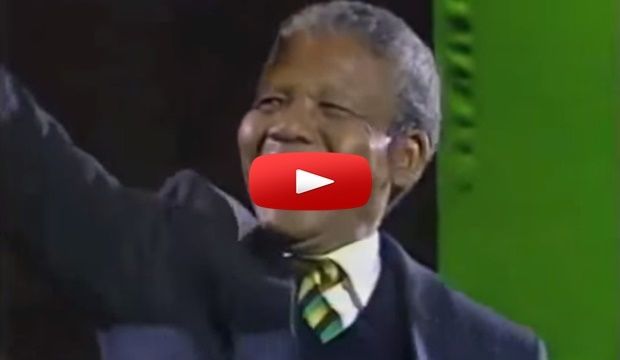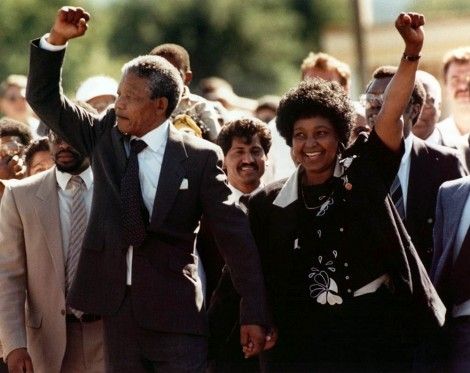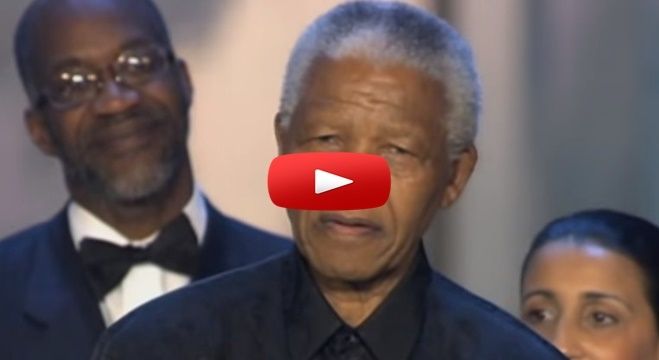Mandela release from prison speech full speech
Nelson Rolihlahla Mandela was a South African anti-apartheid revolutionary, politician, and philanthropist, who served as President of South Africa from 1994 to 1999.
Click here to watch this video

http://www.nidokidos.org/threads/247873
Nelson Mandela: He Sacrificed His Freedom
So Others Could Be Free
by Vikas Nath : FPJ

After more than 27 years in detention, Mandela walks out of the Victor-Verster Prison in Paarl on Feb. 11, 1990, accompanied by his wife Winnie (Greg English/AP)
Nelson Rolihlahla Mandela, the last of the giants who led South Africa's struggle against colonialism, is no more. "White supremacy implies black inferiority." His words were truth to the powers and he devoted his life to opposing systems that protect and abet this superiority. It made him the most recognizable icon of struggle against oppression, injustice and discrimination all over the world.
Mandela, or Madiba as he was popularly known to fellow Africans, was a qualified lawyer who later became the first black president of South Africa. More than just a politician, he was a political activist. Mandela truly believed in the cause of freedom, democracy and justice. He experienced first-hand how apartheid had stripped black South Africans of their dignity and was holding them back, and took up the cause for equal political rights for blacks.
In 1944, Mandela joined the African National Congress (ANC) and participated in the resistance against the apartheid policies of the white South African government. He wanted to change the situation in South Africa where whites were rich and the blacks poor, and the laws which allowed this to happen. He wanted nothing less than banishing the "apartheid" system of governance which allowed one group to establish supremacy and dominate the other.
In his initial years, Mandela called for calm and sober assessment of the political situation that had subjugated the blacks after centuries of tyranny, exploitation, and oppression by the whites. But when every lawful way of protesting against injustice and discrimination was taken away from the blacks, and violence and intimidation was unleashed on them, he learned the hard way that it is the oppressor who sets the nature of the struggle. "The oppressed is often left with no recourse but to use methods that mirror those of his oppressor. After a point, one can only fight fire with fire."
In 1961, Mandela formed the military wing of the ANC, the Umkhonto we Sizwe (Spear of the Nation), which was involved in targeting and sabotaging government facilities, destruction of power plants, and interfering with rail and telephone communications. The motive was to scare away foreign capital and cut the external economic and trade links which were propping up the apartheid regime. Mandela and his colleagues were soon arrested and put on trial.
During his open trial, popularly known as the Rivonia Trial or the trial that changed South Africa, Mandela spoke from the docks about economic and political injustices faced by blacks in South Africa in their everyday lives. He talked about how Africans wanted to live normal lives, be paid living wages, and perform work which they were capable of doing and not what they had been told to do. How poverty and the breakdown of family life had secondary effects; children wandered the streets of townships because they had no schools to go to, or no money to go to school, or no parents at home to see that they go to school, because the parents had to work to keep the family alive. This led to a breakdown in moral standards, to an alarming rise in illegitimacy, and to growing violence that erupted not only politically, but everywhere. He wanted blacks to have a just share in the whole of South Africa, a stake in society.
The Rivonia Trial was watched by the whole world. But the words of Mandela had no effect in the courts run by an apartheid government. While the Afro-Asian nations strongly condemned the ongoing trial, the Western states turned their backs. Britain, the US, and France also abstained from the UN Security Council resolution passed two days before the verdict in the Rivonia Trial urging the apartheid government to grant amnesty to all political prisoners convicted or being tried for their opposition to apartheid. This emboldened the white South Africa, as it faced no serious challenge to it apartheid policies from Western states.
On 12 June 1964, Mandela was sentenced to 27 years in prison at Robben Island and reduced to prisoner number 46664. He accepted it with dignity. He knew that overthrowing apartheid called for struggle and sacrifice, and was prepared for the long walk to freedom.
Ten thousand days in prison failed to break Mandela. Jail honed Nelson. It made him and the country. Jail could not capture him, no more than release from jail could not set him free, for he was always free. He knew that his dream of South Africa as a rainbow nation free from injustice and domination would eventually be realized, and no oppressor could suppress this dream. He refused to compromise on his beliefs or leave the struggle halfway. In February 1985, President P.W. Botha offered Mandela his freedom on the condition that he reject violence as a political weapon, but Mandela rejected the proposal. His response was a rebuke to the apartheid regime and its supporters. "What freedom am I being offered while the organization of the people remains banned? Only free men can negotiate. A prisoner cannot enter into contracts."
The white leadership had hoped that confining the top black leaders to long years in prison would create a vacuum in leadership and kill the struggle for liberation. While Mandela was locked into the penal system and ANC driven into exile, the agitation they had unleashed and the fierce desire they had evoked among blacks to be free could not be suppressed. The pressures to end apartheid continued from within and outside. It forced the regime to open dialogue and negotiate with the incarcerated leaders of the struggle. Mandela was not forgotten. He had become the most prominent symbol of resistance among youths as well as old-timers.
On 11 February, 1990, Mandela was released from prison. It was an unconditional release. He was free to do what he wanted and he set himself to fulfilling the task of transforming South Africa from a white-only to a rainbow nation, and from a decaying apartheid regime to a new non-racial democracy. It culminated in South Africa's first democratic elections of 1994 wherein its most recognised apartheid prisoner became the new president. The 27 years of imprisonment at the hands of white supremacists did not leave him bitter. Instead he sought the middle ground between "white fears and black hopes". That vision was reflected in the "Freedom Charter" of the ANC party which opens with the words "South Africa belongs to all who live in it, black or white."
South Africa may have been politically free, but Mandela knew that business of decolonization was not yet finished. Political freedom without economic and social justice is meaningless. Much needed to be done to reverse the consolidation of land, natural resources and wealth brought about by centuries of colonization. Black empowerment would only be complete when they had equal economic opportunities, when the pride and dignity battered by apartheid governments were restored.
Mandela remained staunchly loyal to the people who supported his cause of liberation and justice. This was put to test several times after he became president, when he strongly defended his ties with Libya and Cuba. He let it known to the world that it was pure expediency to call on democratic South Africa to turn its back on Castro and Gaddafi, who contributed funding and arms to the ANC and assisted them in obtaining democracy while the West—wanting to protect its economic and military interests in white South Africa—looked the other way.
Mandela taught us what it means to be nationalistic. His vision of African nationalism was a force of good and stood for the concept of freedom and fulfilment for the African people in their own land. He was able to transform subjugation, suffering and injustices faced by black people into a national struggle—a struggle of the African people and by the African people for their right to live. It was not about superiority of one group over the other but about equality. This can be better understood in his own words at the Rivonia Trial: "During my lifetime I have dedicated my life to this struggle of the African people. I have fought against white domination, and I have fought against black domination. I have cherished the ideal of a democratic and free society in which all persons will live together in harmony and with equal opportunities. It is an ideal for which I hope to live for and to see realized. But, My Lord, if it needs be, it is an ideal for which I am prepared to die."
Mandela knew when voice had to be raised and when silence was more effective. He was the liberation movement's rallying cry through 27 years of incarceration and country's moral compass once he stepped down from public office. However, the biggest legacy of Mandela is the redemptive power of forgiveness in a world beset by violence and turmoil. He taught us that complete victory lies not in rage and revenge but in forgiveness. The struggle, oppression, and long years in prison did not make him bitter or vengeful. He opted for reconciliation once the regime which subjugated his people came down.
Mandela also taught us that if you wish to enter public life, then enter it with the goal to serve the public and the determination to stick to that goal no matter what adversities come in the way. It calls for sacrifices – to sacrifice one's freedom so that others can be free. To maintain moral leadership even when the enemy has lost its morality.
It is a cause for celebration and inspiration that a man of such conviction and principles lived among us. Till his death, he remained an African true to the soil. "I have done whatever I did, both as an individual and as a leader of my people, because of my experience in South Africa and my own proudly felt African background, and not because of what any outsider might have said."
Nelson Mandela, South Africa
Nelson Mandela speech that changed the world
Nelson Mandela speaking at the Laureus World Sports Awards 2000 in Monaco.
Click here to watch this video

http://www.nidokidos.org/threads/247874
Posted by: ABDULLAH-AL SHAFI <shafi_abdullah@yahoo.com>
| Reply via web post | • | Reply to sender | • | Reply to group | • | Start a New Topic | • | Messages in this topic (1) |
NidokidoS Group for best of forwarded mails
To join us , send an email to
nidokidos-subscribe@yahoogroups.com
Be the part of Nidokidos , Join our Forum
http://www.nidokidos.org
to share your emails with us, send them at
nidokidos@yahoogroups.com
===================================================
No comments:
Post a Comment